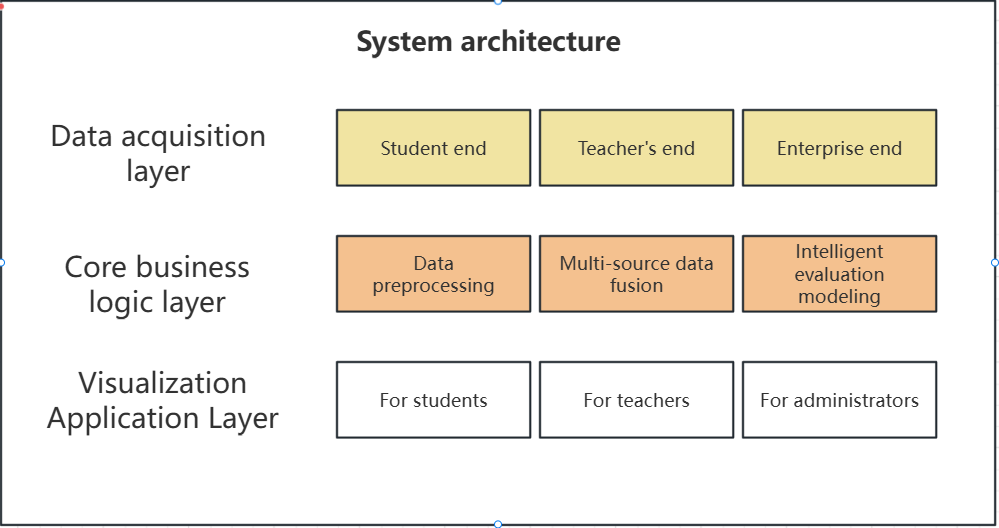Research on Intelligent Evaluation System for Internship Quality in Higher Vocational Colleges Based on Multi-Source Data Fusion
DOI:
https://doi.org/10.62677/IJETAA.2509139Keywords:
Multi-source Data Fusion, K-means Algorithm, Django Framework, Data VisualizationAbstract
This paper is solving the problems of subjectivization, data fragmentation and feedback lag in the traditional internship evaluation model for higher vocational students as its core objective. Relying on the internship scenario of the School of Information Engineering of Guangdong Asia Television College of Performing Arts, it conducts research on an intelligent evaluation system for higher vocational internship quality based on multi-source data fusion. The research integrates multi-dimensional data such as student internship logs, enterprise evaluations, teacher feedback, and attendance records. With Python as the core technical language, combined with the Pandas data cleaning library, Scikit-learn machine learning library, and Django Web development framework, Build a complete technical chain of "data collection - cleaning and integration - intelligent analysis - visual output". The system introduces the K-means clustering algorithm to classify students' internship performance (such as "technical and skilled type" and "comprehensive and coordinated type") and uses Natural Language Processing (NLP) technology to extract implicit indicators in text data (such as professional attitude and problem-solving ability). And optimize the system quality from seven dimensions such as functional applicability, performance efficiency and safety in accordance with the ISO/IEC 25010 international standard. An empirical test was conducted by selecting 300 interns, 50 teachers and 50 cooperative enterprises through stratified random sampling. The results show that this system can improve the matching degree between internship positions and students' skills, dynamically monitor the internship process and generate personalized ability diagnosis reports, effectively making up for the shortcomings of traditional evaluation. It provides scientific support for colleges and universities to optimize internship management, teachers to carry out precise guidance, and students to enhance their professional competitiveness. At the same time, it offers reusable technical paradigms and practical references for the digital and intelligent transformation of internship evaluation in the field of higher vocational education.
Downloads
References
M. A. Amasha, M. F. Areed, D. Khairy, S. M. Atawy, S. Alkhalaf, and R. A. Abougalala, "Development of a Java-based Mobile application for mathematics learning," Education and Information Technologies, vol. 26,pp. 945–964, 2021. DOI: 10.1007/s10639-020-10287-0
L. Assalaarachchi, T. Rambukwella, G. Ranasinghe, et al., "Streamlining the internship supervision and evaluation through digital transformation," Educ Inf Technol, vol. 30, pp. 1073–1088, 2025. DOI: 10.1007/s10639-024-13158-0
A. Bhutoria, "Personalized education and artificial intelligence in the United States, China, and India: A systematic review using a human-in-the-loop model," Computers and Education: Artificial Intelligence, vol.3, p. 100068, 2022. DOI: 10.1016/j.caeai.2022.100068
R. Bringula, "ChatGPT in a programming course: Benefits and limitations," Frontiers in Education, vol. 9, p. 1248705, 2024. DOI: 10.3389/feduc.2024.1248705
V. R. O. Delay, "Development and acceptability of E-Tech mobile application," Canadian Journal of Business and Information Studies, vol. 5, no. 3, pp. 70–80, 2023. DOI: 10.34104/cjbis.023.07080
B. G. S. Grepon, N. T. Baran, K. M. V. C. Gumonan, A. L. M. Martinez, and M. L. E. Lacsa, "Designing and implementing e-school systems: An Information systems approach to school management of a community college in Northern Mindanao, Philippines," International Journal of Computing Sciences Research, vol. 6, pp. 792–808, 2021. DOI: 10.25147/ijcsr.2017.001.1.74
Y. He, Y. Jiang, and W. Hou, "Optimizing the internship choice rights of vocational school students: The application and strategies of social practice theory," Journal of Hubei Vocational and Technical College, vol. 27, no. 4, pp. 20, 26–29, 2024. DOI: 10.16347/j.cnki.cn42-1742/z.2024.04.018
L. J. Ismil, A. J. Pinauin, P. M. Solano, C. Centeno, and G. M. Casiw,"Faculty Evaluation and Qualification Analysis System Using Na¨ıve Bayes Algorithm," Nanotechnology Perceptions, pp. 809–825, 2024. DOI: 10.62441/nano-ntp.v20iS2.61
ISO/IEC 25010, "Systems and software engineering — Systems and software Quality Requirements and Evaluation (SQuaRE) — System and software quality models," Geneva: International Organization for Standardization (ISO), 2011. Available: https://iso25000.com/index.php/en/iso-25000-standards/iso-25010
H. Mydyti and A. Ware, "Integrating Intelligent Web Scraping Techniques in Internship Management Systems: Enhancing Internship Matching," Annals of Emerging Technologies in Computing, vol. 9, pp. 1–23, 2025. DOI: 10.33166/AETiC.2025.01.001
C. F. Salazar, "Using cloud-based chatbot builder in developing pedagogical conversational agent," International Journal of Engineering Trends and Technology, vol. 71, no. 7, pp. 301–314, 2023. DOI: 10.14445/22315381/IJETT-V71I7P229

Downloads
Published
License
Copyright (c) 2025 Yujian Liu (Author)

This work is licensed under a Creative Commons Attribution-NonCommercial 4.0 International License.




